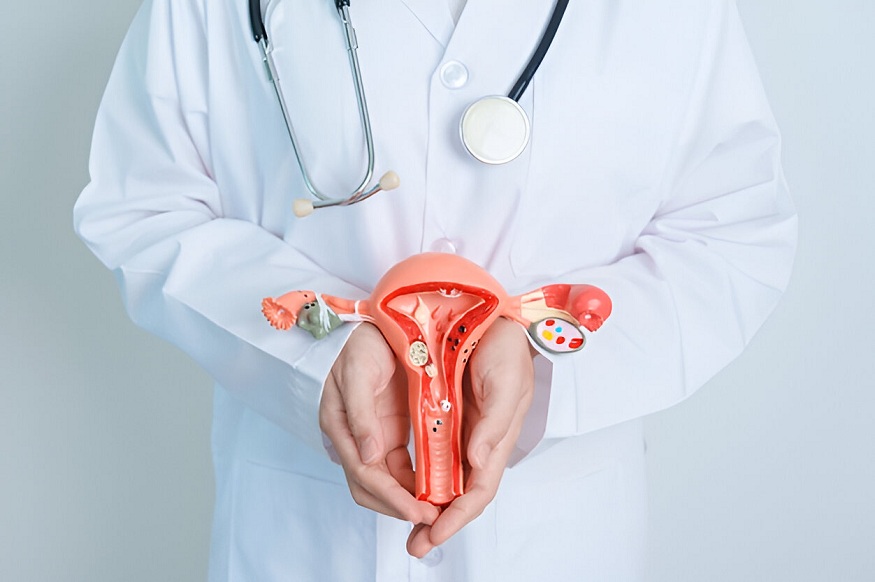Usually, gaining weight remains a common cause of concern among several women, and what will you do if this occurs unexpectedly or without a clear reason? It will be frustrating to you, right? Also, women who are dealing with uterine fibroids will often get questions like, Can fibroids make you gain weight? We cannot answer this in a single word like yes or no, because fibroids themselves may not directly cause fat accumulation, which will result in abdominal distention, bloating, and an increase in overall body weight in several ways.
Further, this comprehensive blog will explore what fibroids are, how they result in weight gain, and what are all the possible ways out there to manage both your fibroids and weight.
What are uterine fibroids?
Uterine fibroids are also called leiomyomas or myomas, which are benign or non-cancerous tumors that typically develop in and around the uterus. They are made up of fibrous tissue and muscle, so they will greatly vary in size from the size of a pea to a large melon.
Women aged between 30 to 50 are more prone to this, and it is more common during the reproductive years. While some fibroids cause no symptoms, others can result in heavy menstrual bleeding, pelvic pain, frequent urination, and, in a few cases, apparent weight gain, in such cases, you should consider reaching out to the urogynecologist in Coimbatore to get the desired results.
The common types of fibroids include:
- Intramural fibroids: Within the muscular walls of the uterus, these will grow.
- Submucosal fibroids: Typically, these will develop under the lining of the uterine cavity.
- Subserosal fibroids: These will typically grow long and exceed the uterus’s outer layer.
- Pedunculated fibroids: These will be closely connected to the uterus.
Each type can contribute differently to symptoms, including the perception of weight gain.
Can fibroids cause sudden weight gain?
Of course, fibroids can cause weight gain, but not like how we imagine by increasing your body fat. Instead, the weight gain is often due to the physical mass of the fibroids, hormonal fluctuations, and secondary effects such as bloating or fluid retention.
Further, let’s see the connection between weight gain and fibroids:
-
Large fibroids add physical mass:
If there are huge or multiple fibroids, the actual mass of the fibroids themselves can contribute to a noticeable increase in weight. Typically, it weighs only a few grams, but the large ones will grow upto several pounds.
- The fibroid can be the size of grape grapefruit will weigh 1 – 2 pounds.
- Also, those multiple fibroids or the ones developing rapidly will collectively add more weight.
This added mass is typically present in the lower abdomen and, at times, will resemble pregnancy or bloating.
-
Abdominal bloating and distention:
In case the fibroids are not large enough, they can still cause bloating and distention due to their location and pressure on nearby organs.
- When your uterus gets enlarged due to fibroids, it will press on your intestines or bladder, resulting in water retention, gas, or slower digestion, altogether, this will make your abdomen feel fuller or heavier.
Though this doesn’t translate into actual fat gain, it will make your clothes tighter and add to the perception of weight gain.
-
Hormonal imbalances and fluid retention:
Fibroids will be greatly triggered by those two vital hormones that regulate the menstrual cycle, known as estrogen and progesterone. Several women with fibroids have elevated estrogen levels, which can:
- Promotes water retention
- Result in breast tenderness and bloating
- Causes an increase in appetite or cravings in some cases
These hormone-related changes will lead to temporary weight changes, notably around the menstrual cycle.
-
Lifestyle changes:
At times, women with fibroids tend to experience signs like pelvic pain, fatigue, or heavy menstrual bleeding that makes it harder to stay active. Over time, reduced physical activity will result in:
- Decreased muscle mass
- Slower metabolism
- Slow weight gain unrelated to fibroids themselves
It’s a secondary effect, but nonetheless important to consider when evaluating weight gain with fibroids.
-
Constipation and digestive problems:
As mentioned above, fibroids can press on your bowel, notably large subserosal fibroids, resulting in constipation or sluggish digestion. This not just creates discomfort but also makes you feel heavier or more bloated than usual, contributing again to a sense of weight gain, even if body fat has not increased.
What are the ways to treat fibroids and weight gain?
Treatment will be given based on the size, number, signs, and your desire for future pregnancy. The common options include:
-
Medication:
- Hormonal therapies will help shrink the fibroids.
- Birth control pills to manage symptoms
- Anti-inflammatory drugs for pain relief
-
Non-surgical procedures:
- Uterine fibroid embolization (UFE): Disturbs the blood supply to fibroids, and it will cause them to shrink.
- MRI-guided focused ultrasound (FUS): Destroys fibroid tissues using high-intensity sound waves.
-
Surgical options:
- Myomectomy: This method involves removing the fibroids along with preserving the uterus.
- Hysterectomy: Complete removal of the uterus.
When the fibroids are removed or shrink, several women will notice:
- Reduction in abdominal size
- Improvement in digestive issues
- Better hormonal balance
- Can easily manage weight
The above-mentioned ones are the list of treatments provided in the best urogynecology hospital in Coimbatore to treat fibroids.
Final thoughts:
In conclusion, we can say that fibroids can indeed contribute to weight gain, but not in the typical way. The growth of large fibroids, hormonal shifts, bloating, and lifestyle modifications caused by fibroid symptoms can all play a role in increasing or redistributing body weight. Also, most of the weight is due to physical mass, water retention, or abdominal retention rather than actual fat accumulation. Simply, when noticing abrupt and unexplained weight gain, notably accompanied by pelvic symptoms, it’s worth discussing with a healthcare provider.

